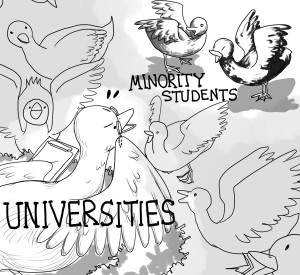Affirmative action counterproductive
As the Supreme Court seems once again poised to take up the topic of race-based affirmative action in college admissions decisions, America is reminded of the damage universities have inflicted in the name of multiculturalism.
Universities defend race-based affirmative action admission policies in the name of advancing diversity and promoting social harmony. But this branch of affirmative action has little social benefit.
In 2003, the Supreme Court decision in Gratz v. Bollinger prohibited universities from giving applicants automatic advantages based on race or ethnicity. A subsequent Supreme Court ruling affirmed, however, that colleges could consider both factors as part of a case-by-case assessment of individuals.
As a result, hundreds of prestigious universities across the nation have been able to award acceptances on the basis of race. An April 1 article in The New York Times found that even when laws restrict this practice, many universities find ways to get around them.
Race-based affirmative action is nothing more than legalized racism, which erodes the quality of education and undermines true hard work.
If administrators do not want to judge minorities by the color of their skin, they have to refrain from using race as justification in university admissions. They can no longer see race as an implied setback in society; it is certainly not indicative of a disadvantaged upbringing.
Asian-Americans, blacks and Hispanics don’t choose their race, yet almost every university unfairly tips admissions decisions in the favor of the latter groups, according to The New York Times. To assert that differences in race make one group different from another is to imply that a person’s race comes attached with certain homogenous qualities and experiences.
Utilizing affirmative action to advance students from underprivileged backgrounds is much more reasonable than basing the practice on a factor as arbitrary as race. Indeed, a strong case can be made that prospective students from wealthy families have a much larger advantage in the college admissions process than students from families that are less financially stable.
Socioeconomic upbringing can very well determine the trajectory of a student’s college admissions process. Wealthier students have access to private tutoring, SAT practice tests and expensive college counselors. Relying on race, however, to imply socioeconomic disadvantages is akin to modern-day stereotyping.
Every college application deserves to be evaluated fairly and consistently. Using race to favor one student over another is not only unjust in practice. It is fundamentally rooted in an illogical and flawed premise.
The Supreme Court should affirm the irrationality of race-based affirmative action policies and pressure American universities to eradicate this absurd practice.
Ryan Townsend is a freshman majoring in business administration.


Reverse discrimination is not just an academic issue, but one in business as well. Back in the 90’s it was a hiring practice among most companies to hire/promote women into positions of leadership and management, no matter their experience level, not their ability to lead. Many men were overlooked for promotions, because the companies were forced to comply with governmental mandates to hire and promote more women.
Our country was built on the premise that if you are sdmart and do well, you’ll succeed. And yes, there have been many women who were passed over for wearing a skirt, but times have changed. we don’t need those mandates any longer. We need to rid ourselves of affirmative action, as it has run its course and no longer needed.
“Our country was built on the premise
that if you are sdmart and do well,
you’ll succeed.”
Interesting! Which country are you from?
Great article! I completely agree